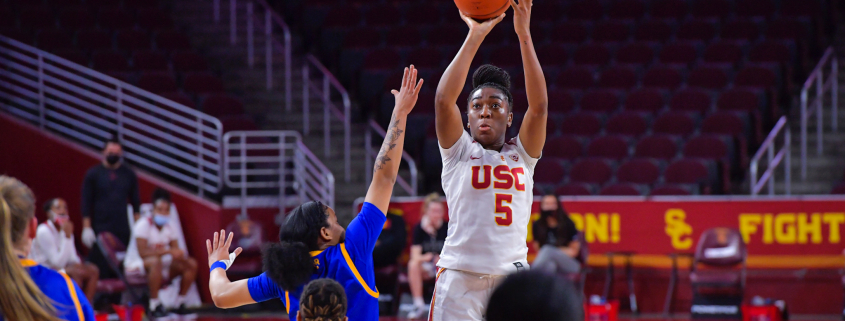Trakh and company look to find their groove

USC’s women’s basketball team currently sits at 6-6 following a slow start to the season. After defeating LMU in their season opener, the Trojans dropped their first four games of Pac-12 play, forcing them to play catch-up from the get-go.
Head coach Mark Trakh’s squad had a similar slow start last season, dropping their first five conference games before picking up three straight wins.
This season, the Trojans again responded well to an early rough patch. They currently enjoy a three-game winning streak in conference play and have won four of their last five against Pac-12 opponents after starting 0-4. In its last week of action, USC picked up an overtime win against Washington State before falling just short of a second-half comeback in a disappointing loss to UC Riverside.
The improvement in conference play is not accidental, according to sophomore center Angel Jackson.
“We’ve just been trusting each other more, playing hard as a team.” Jackson said. “Our communication is getting way better, and that’s all we need on the court.”
A notable absence from the team earlier this season was sophomore forward Alissa Pili. Pili was the Trojans’ leading scorer last season and 2019-2020 Pac-12 freshman of the year. She missed ten of twelve games due to an ankle injury, and made her season debut on Jan. 15 in an overtime win against Washington State.
Trakh said Pili was playing well before her injury, and the team expects her to be fine once she’s able to get back to game speed.
Pili’s absence has forced the team to make up for her production in scoring and rebounding. Graduate transfer forward Jordan Sanders has settled into Trakh’s rotation nicely, as she’s tied with junior guard Desiree Caldwell for the highest average of minutes played per game on the team at 31.9.
Trakh said the transition process has been “easy” for Sanders, who spent three seasons at UC Irvine, given her ability to score. Sanders averaged 20.3 points per game in her sophomore season at UCI, good enough for second in the Big West that season.
Sanders’ scoring abilities have translated well to Pac-12 competition. Her average of 15 points per game is the second-highest on the team despite starting in less than half of the games she’s appeared in. Prior to Sunday’s loss to UC Riverside, Sanders had scored ten or more points in nine straight games.
The brunt of the scoring load has been picked up by sophomore guard Endyia Rogers, who has also passed the ball well, leading the team in assists as well. Rogers has built upon an impressive freshman season, averaging 16.4 points per game along with 3.9 assists while shooting at an improved efficiency from the field compared to her freshman season.
“She’s shooting the ball better, she’s shooting the three better, her assist to turnover ratios are good.” Trakh said of Rogers. “We’re very proud of her and how she’s improving.”
While Rogers and Sanders have done well filling in for Pili’s production on the offensive end, Jackson and freshman forward Amaya Oliver have been effective in picking up the slack in the rebounding department. Jackson is averaging a team-high 6.5 rebounds per game, while Oliver is bringing down just below that at 6.2 per game. Oliver has also done well earning her teammates extra possessions, leading the team with 2.3 offensive rebounds per game.
Trakh’s team has had to be flexible with scheduling all season, as multiple games have been postponed due to issues with the coronavirus at numerous Pac-12 schools. Just two weeks before the season was set to tip off, the Trojans were forced to suspend all team activities after a player on the team tested positive for the virus. The chaos of this season has made team morale a crucial component of success, even more so than in previous years.
“The chemistry we have has been impressive,” said sophomore guard Kyra White. “We all just want to win and play hard for each other, and we’ve just got to be better.”
Despite strong chemistry, the uncertainty of the schedule has made it difficult for the Trojans to find rhythm and build consistent positive habits as the season progresses.
“Coming prepared to practice, to games, to weights, to film, that’s where it all starts,” White said. “That’s where we have miscues sometimes, and we’re going to be better.”
To Trakh, a successful end to the season would include an NCAA tournament bid, something USC has yet to do in the first three seasons of his second stint as head coach.
“It’s our fourth year here; I would expect that I want to go to the tournament,” Trakh said. “We’ve got to do it sooner or later, why not this year?”
The Trojans have proven they are capable of competing with and beating the very best in the conference over the past two seasons, which probably explains Trakh’s hesitance to rule out a potential run in the Pac-12 tournament to secure an NCAA tournament bid.
The Trojans last qualified for the tournament in the 2013-14 season under former head coach Cynthia Cooper-Dyke. USC currently sits eighth in the Pac-12, with matchups against every opponent in the conference left in the season.

